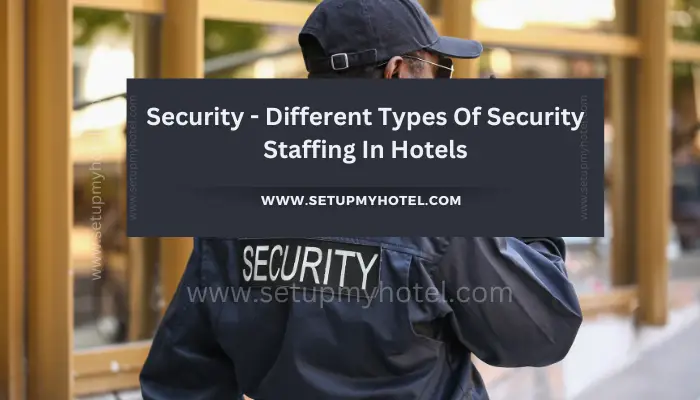Types of Security Staffing in Hotels
SecuritySecurity is the prevention of theft; fire; and other emergency situations in the workplace. is a crucial aspect of any hotel business. It is essential to ensure the safety and security of all guests and staff members. There are various types of security staffing in hotels, each with distinct roles and responsibilities.
One of the most common types of security staffing in hotels is the front desk security personnel. They are responsible for monitoring and ensuring the safety of the hotel’s lobby area. They keep an eye on any suspicious activities and keep track of who is entering and leaving the hotel.
Another type of security staffing in hotels is the security guards. They are responsible for patrolling the hotel premises and ensuring the safety of guests and staff members. They are trained to respond to emergency situations and take appropriate action if needed.
Some hotels also employ security cameras to monitor the hotel premises. These cameras are usually placed at strategic locations to capture any suspicious activities. The footage is monitored by trained security personnel who can respond quickly to any security issues.
In addition, some hotels also have specialized security personnel, such as bomb detection experts or canine units. These personnel are trained to handle specific security threats and ensure the safety of the hotel and its occupants.
While developing a security program, a hotel or motel will need to consider whether to hire staff as a full-time person to contract with some security agencies, or arrange for part-time protection with local off-duty police personnel, etc.
Because of a facility’s size and organizational structure, it may be appropriate to assign a security response to a member of the management staff such as a ResidentThe guest who is staying in the hotel. manager or Human resource director.
If management decides the property needs a security department, it must determine whether the department should be a proprietary unit with in-house staff functions or a security program run through a reputable, licensed contract security company.
Contract Security:
The proponents of contract security organizations argue that such organizations can provide sophisticated services at a considerable saving. In addition, they assert that a reputable contract security company will provide thoroughly screened, tested, and trained personnel.
In-house security personnel may become too familiar and friendly with the other employees. If a guard catches a friend stealing they might hesitate to report that friend. Some people believe that this situation is likely to occur if the security personnel are supplied by an outside agency.
In Selecting a security company make sure that extensive guard training geared specifically to each facility is provided. Review contracts and insurance requirements with legal counsel. Be clear and specific regarding the services to be provided by the contract organization. Determine whether the security service can provide a sufficient number of personnel on short notice in case of a large-scale emergency.
Carefully construct the contract so there will be no misunderstanding as to the supervision of the contract security organization while the contract officers; supervision should be provided by the contract security organization while the contract staff is on the premises. The management of the lodging facility should carefully establish exactly what the contract employees are to do under most conceivable circumstances.
In-HouseIn-House is the all guest that are registered with the Hotel. Security:
The House Security Department points out several advantages to this system. They emphasize the fact that a hotel or motel has greater control over security officers or staff members without intermediate outside supervision. They also argue that training for in-house security staff members can be much more directly related to the lodging industry. They believe that the peculiarities and special needs of the industry are more effectively addressed by those within the industry than by those in a contractual relationship with the industry.
The quality of personnel is under the direct control of the hotel is a proprietary system, rather than under the control of the contract security company, and the director and staff of an in-house department are more effectively integrated with the other departments and personnel of the property.
Finally, they point out that a greater sense of loyalty may be developed among in-house staff since career paths can be established that move security personnel into other roles in the organization.
Off-Duty Police:
Some properties use off-duty police officers for their security staff. There are certain benefits associated with this practice. Such officers have superior training in reacting to and dealing with crimes and other emergencies, they understand the law, they are used to dealing with people they may be better able to identify known criminals, they are immediately recognized as authorities, and they often do have more authority than ordinary citizens.
In addition, police liaison and response may be enhanced. However, there may be potential drawbacks as well.
1) Police officers may be oriented more toward apprehension functions than toward prevention.
2) Some jurisdictions require off-duty officers to be armed and this may not be desirable.
- Officers may be working at the hotel following a full-duty police shift and the fatigue factor must be considered.
Overall, hotels must have a comprehensive security plan in place to ensure the safety and security of all guests and staff members. This includes employing different types of security staffing to cover all areas of the hotel premises. All decisions concerning security deserve careful thought and should be discussed with legal counsel. Each option has its advantages and disadvantages.











